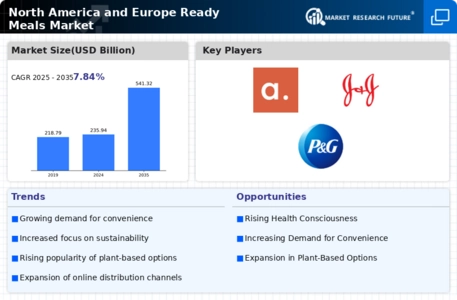By Region, the study segments the market into North America, Europe, Asia Pacific, South America, and the Middle East & Africa. North America Ready Meals market accounts for the largest market share 52.97% in 2022 and is expected to exhibit a 4.32% CAGR due to the fast-paced lifestyle of consumers. Additionally, the rise in dual-income households and the growing number of single-person households have further contributed to the popularity of ready meals, as they offer portion-controlled servings and eliminate the need for extensive cooking and clean-up.
Europe accounts for the second largest market share because of a growing inclination towards plant-based diets, driving the demand for legume and grain-based ready meals. As a key player in the North America and Europe Ready Meals industry, North America has witnessed a surge in the production and consumption of Ready Meals. Further, US Ready Meals market held the largest market share, and the Canada Ready Meals market was the fastest-growing market in the North America region.
Further, the major countries studied are The U.S., Canada, Germany, France, UK, and Italy.
Figure 3: NORTH AMERICA AND EUROPE READY MEALS MARKET SHARE BY REGION 2022 (%)

Source: Secondary Research, Primary Research, Market Research Future Database and Analyst Review
The North American ready meals market has witnessed significant growth and transformation in recent years, fuelled by changing consumer lifestyles, urbanization, and the increasing demand for convenient food options. Ready meals, which encompass a wide range of pre-packaged, easily prepared food items, have become a staple in many households across the region. This market encompasses various segments, including frozen meals, refrigerated meals, shelf-stable meals, and others, catering to diverse consumer preferences and dietary requirements. One of the key drivers of the ready meals market in North America is the fast-paced lifestyle of consumers.
With hectic work schedules and limited time for meal preparation, many individuals and families opt for ready meals as a convenient and time-saving solution. Additionally, the rise in dual-income households and the growing number of single-person households have further contributed to the popularity of ready meals, as they offer portion-controlled servings and eliminate the need for extensive cooking and clean-up. Another significant factor driving the growth of the North American ready meals market is the increasing emphasis on health and wellness.
As consumers become more health-conscious and seek nutritious food options, manufacturers have responded by offering a variety of ready meals that cater to specific dietary needs, including gluten-free, organic, low-sodium, and plant-based options. This focus on health and wellness has expanded the appeal of ready meals beyond convenience, making them a viable choice for consumers looking to maintain a balanced diet without sacrificing taste or quality. The North America Ready Meals market comprised of the US and Canada, among which the US emerged as the frontrunner with a market share of 88.00% in 2022.
The Europe Ready Meals market is expected to grow at the highest CAGR of 4.74% from 2022 to 2032. The European Ready Meals market is dynamic and changing quickly, driven by unique trends, drivers, and a lot of possibilities. In Germany, known for its focus on health and sustainability, there is a growing inclination towards plant-based diets, driving the demand for legume and grain-based ready meals. German consumers prioritize organic and locally sourced ingredients, leading to the emergence of niche brands offering innovative options in the segment.
Moreover, convenience remains a key driver in Germany's urban centers, where time-pressed consumers seek nutritious yet convenient meal solutions.
In the United Kingdom, the ready meals market reflects a similar trend towards healthier and more sustainable options. With a significant rise in vegetarianism and veganism, legumes and grain-based ready meals have gained popularity among British consumers. Major retailers and food manufacturers have responded by expanding their product lines to include plant-based options that cater to diverse dietary preferences. Additionally, there is a growing emphasis on ethnic cuisines, with legume and grain-based dishes from around the world becoming increasingly accessible in the UK's ready meals market.















Leave a Comment